Fate of the UOC MP: Road from the Temple
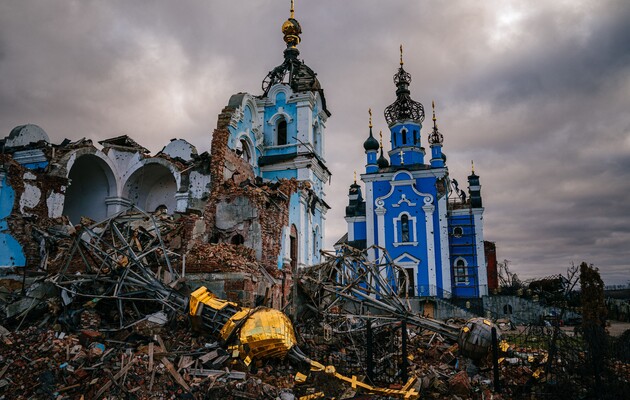
The war with Russia – at first hybrid, now full-scale – has caused colossal losses to the Ukrainian Orthodox Church of the Moscow Patriarchate, both material and non-material. This denomination lost many churches destroyed by the so-called russian liberators and many parishioners wiped out by them. It lost not only the good relations with the authorities, which it had enjoyed for decades, but also the “immunity” that protected its clergy. And most importantly, it lost the remnants of the trust of Ukrainian society.
Temples of discord
One may reach this conclusion according to the results of a poll conducted by the Razumkov Center on the order of ZN.UA in April–May 2023. Only 8.2% in response to the question: “Which church do you belong to?” mentioned the Ukrainian Orthodox Church of the Moscow Patriarchate (see Fig. 1). Only 7.2% of respondents said that they trust Metropolitan Onufriy of the Kyiv UOC MP (see Fig. 2).
This generally negative attitude of Ukrainians towards the so-called Moscow Church is clearly manifested in the support of the government’s initiatives to deprive the UOC MP of its property. In the opinion of many, this is not even “deprivation of property” but an act of justice. The UOC MP loses the privileges it received solely thanks to its status as an imperial church. For many of us, the eviction of the UOC MP from the temples is a symbolic act of the destruction of the imperial hegemony in our spiritual life. It is a necessary part of the struggle that is being waged at the front.
If the fate of the Kyiv-Pechersk and Pochaiv monasteries was in the hands of ordinary Ukrainians, the question of who they should belong to would not be resolved in favor of the UOC MP: only 6.2% of respondents believe that the Kyiv-Pechersk and Pochaiv monasteries will continue to irrevocably belong to former owners. Meanwhile, 63% of respondents believe that both monasteries should be taken away from the UOC MP (see Fig. 3).
And this applies not only to the two main shrines of the country. The same support is enjoyed by any efforts to deprive the UOC MP of property in all corners of the country. Despite the illegality of local authorities' decisions, unspeakable images of fights, clouds of tear gas in churches, 60% of Ukrainians support the decisions of local authorities, which refuse the UOC MP to extend the lease and use of religious buildings and land plots. 14.4% of respondents do not support these decisions (see Fig. 4).
In the UOC MP itself, this attitude towards themselves on the part of the authorities and citizens is explained by anything: propaganda, “individual mistakes on the ground,” tricks of competitors, political orders, mass madness and even an attack on the Prince of this world personally. But, obviously, that's not the case. For decades, the Ukrainian Orthodox Church of Ukraine nurtured historical ties and thoughtfully formed "traditions" that connected Russia and Ukraine. They are now under review and should be torn down. The process of decolonization affects the church in the most direct way.
Association games: UOC MP and “Russian world”
As the research of ZN.UA showed, the majority of Ukrainians associate themselves with a certain church, although they do not belong to it. Churches are traditionally used by us as factors of self-identification – (anti-)national and (anti-)civil, that is, they are most directly involved in politics. Therefore, never believe those who say, “the church is out of politics.” Only God can be outside of politics (although this too is not certain). But the church is a completely earthly institution and breathes the same air as everyone else, believers and unbelievers.
The full-scale war exacerbated many things, turning mere “strangers” into “enemies.” Answering the question “Who is your internal enemy?”, 12% of those polled said: “Those who visit the UOC MP” (see Fig. 5). Only 6% of respondents believe that the UOC MP should be left alone and allowed to work in Ukraine. At the same time, 45% of respondents believe that the activities of the UOC MP in Ukraine should be banned (see Fig. 6).
According to the survey, Ukrainians cannot forgive the UOC MP two things: the preaching of the “Russian world” through which the church poisoned the consciousness of Ukrainians for many years, and collaborationism in various forms (see Fig. 7).
The preaching of the “Russian world” is a serious reproach that 43.2% of Ukrainians throw at the UOC MP. Throughout its entire history, the UOC MP has quite frankly preached “Holy Rus”: the heavenly reflection of the “brotherhood of peoples” in the format of the Russian Empire. If the joke about the “atheists of the Kyiv Patriarchate” was a joke in part, then the joke about the special “Russian statement of faith” in the “Unified Holy Cathedral Apostolic Church of the Moscow Patriarchate” is hardly a joke at all.
The full-scale war was not able to change this: even such a “cosmetic” measure as ceasing to commemorate Patriarch Kirill during divine services caused a whole storm of discussions about the “canonicity” of such a decision. And the leadership of the church never made any decision regarding this issue: it was left to the discretion of each specific cleric and parish.

Without condemning the doctrine of the “Russian world,” preaching and any promotion of this doctrine is not a crime against state security and national interests but only a “view.” You can condemn views or ban them only in “manual” mode. However, church politics in Ukraine has been conducted in exactly this mode throughout all years of independence.
Bad good church
Fewer respondents – 28% – have reproached the UOC MP with respect to collaborationism. But these are only those who have condemned the UOC MP for the direct cooperation of specific representatives of the church with the occupiers during the war. However, long-term cooperation with the aggressor state can be attributed to the same rubric. 39% of respondents believe that the UOC MP is connected with Russian special services, 36% are sure that the UOC MP is controlled from Moscow, 22% of respondents find the fact that the UOC MP was financed by Russian and pro-Russian sponsors suspicious. In general, there are too many “shameful ties.” One more is added to the same series of reproaches: almost 36% of respondents have noted that the UOC MP has never once condemned Russian aggression in the period from 2014 to February 2022, and even on the contrary supported the Russian narrative about a “civil conflict” (see Fig. 7).
However, even with collaborationism, everything turns out to be difficult if we transfer this question from the plane of research to the plane of the law. Only those who committed the crime can be judged for it, not the entire structure to which the collaborators belong. Russian agents worked (and, unfortunately, continue to work) in any organizations – in particular state, in particular law enforcement agencies. This is not a reason to close and ban, for example, the Security Service of Ukraine.
The UOC MP emphasizes exactly this: judge, they say, those who are guilty and leave the rest alone. We are actually one of you: our parishioners fight and volunteer, and for every collaborator we have a real patriot. As you know, the Lord was ready to have mercy on Sodom for the sake of ten righteous people.
But it doesn’t matter at all. Two reasons can be given right away. First of all, just as there is no collective responsibility, the whole city cannot sit behind the back of one righteous person (the example of Sodom is quite characteristic). Secondly, it does not matter at all who serves where and how they volunteer: politics in the UOC MP is not made by volunteers, decisions are not made by front-line parishioners. All earthly power in the church is in the hands of bishops. And this was particularly noticeable against the background of the Council in Feofania, which did not manage to break the ties connecting the UOC with the MP. Although many clerics and believers really wanted it.
About the “top” and “bottom”
The fact that there are, as it were, “two churches” in the church, is commonplace. “Princely” bishops and parish life exist separately. Those at the “top” and at the “bottom” have their own problems and interests, and these two realities rarely intersect. To one degree or another, this can be said about almost any hierarchical structure.
So in the UOC MP, as long as the parishioners are suffering from the war unleashed by Moscow and are working for victory, the bishops cannot make a decision to break with it. They were always comfortable in the market-like and clean niche that they created for themselves over the years: the niche of the “single canonical church” in Ukraine. A break with Moscow automatically means the destruction of this niche because it is Moscow that is the guarantor of their “canonicity.” Therefore, the episcopate’s efforts are aimed at maintaining the status quo. How to ride out the storm. In the hope that later it will be possible to return to the “normal” – pre-war – state of affairs.
But here’s what’s interesting: in spite of everything, the congregants of the UOC MP still trust their bishops. The rating of trust in bishops among those who consider themselves parishioners of the UOC MP (which, let me remind you, is 8.2% of Ukrainians), is 72.1%. This is much higher than the average for Ukraine among people who believe themselves as belonging to the Christian church – 56% (see Fig. 8). How naive or “perfect in obedience” does one have to be in order to trust personalities like the governor of the Lavra Pavel?

That said, sympathy for Bishop Pavel is a matter of taste. Something else is important: a statistically significant part of the population of Ukraine continues to trust people who frankly do not want to leave the comfort zone provided and guaranteed by Moscow. A serious challenge for both society and the authorities.
However, this is also a challenge for the church. The bishops and congregants of the UOC MP – “bad” and “good,” devotees of the “Russian world” and patriots, collaborators and fighters of the Armed Forces of Ukraine – are not ready to change anything.
Collective (ir)responsibility
In fact, for people involved in church life, the “church” is mostly their parish. They are ready to take responsibility for it and even fight, up to the point of physical violence, as recent events show.
According to a survey by the Razumkov Center, almost 73% of those who identify themselves with a certain parish are ready to defend their community: 31.4% are ready to use force if necessary, and another 41.4% are ready to protest by non-violent methods (see Fig. 9).
But the idea that one should be responsible for the church in general is rejected by most believers. After all, bishops are responsible for “politics” in the church: they are endowed with both authority and trust. So let them step up to the plate and be responsible for everything. Quite convenient: there is always someone to point a finger at.
However, in general, citizens of Ukraine do not agree with this distribution of responsibility in the church. Only 13% of those interviewed during our research agree that only the head of the church and the episcopate should be responsible for the cooperation of the UOC MP with the Russian occupiers and support for aggression. 29% of those polled believe that this responsibility is shared by all who belong to the UOC MP (see Fig. 10).
36% of respondents advocate the personal responsibility of those who cooperated with the enemy. On the one hand, this is a very modest indicator: from the point of view of legal consciousness, responsibility for any crime, including high treason, cannot be collective. On the other hand, the word “responsibility” is not limited exclusively to the legal field. It is also an individual moral responsibility for the group to which you belong voluntarily and without coercion.
The vast majority of representatives of the UOC MP demonstrate reticence and unwillingness to take responsibility for their church. For his whole church, not just for themselves or their own parish. They hide their own reluctance to correct the state of affairs in their church behind a “church-outside-of-politics” attitude. Instead of trying to change something in the organization dear to their hearts, they pretend to be offended and call for a legal consciousness that does not allow collective responsibility, etc. Although their own legal consciousness should be outraged by the church’s habit of “not washing its dirty linen in public,” i.e., covering the crimes of its own clergy. But most defenders of the UOC MP prefer not to change the state of affairs in their church; instead, they aspire tp defend its right to remain the way it is.
Church of the Empire
Loyalty to Russia was an integral part of the ideology of the UOC MP. The echo of this long work on public opinion persists even now, against the background of the full-scale war: those who associate themselves with the UOC MP are much more loyal to Russians than the national average. This is confirmed by a study conducted by ZN.UA.
26.7% of UOC MP parishioners consider the “network of Russian agents in Ukraine” to be internal enemies (the overall figure for Ukraine is 47%), politicians and propagandists who call for the unity of Ukraine and Russia are classified as “internal enemies” by 19.4% % of believers of the UOC MP (as compared to 46.8% in Ukraine as a whole) (see Fig. 11). 10.9% of parishioners of the UOC MP still have a good attitude towards all Russians without exception (1.9% in Ukraine as a whole) or are ready to blame only Putin out of all Russians (22.4%, while the overall figure is 9.2%) (see Fig. 12). Also, believers of the UOC MP support direct negotiations between Kyiv and Moscow more than others: 46.7% against 23% among all respondents (see Fig. 13).
The “friendship of nations” was converted into devotion to the canonical church, and devotion to the canonical church supports the “friendship of nations.” Therefore, the UOC MP retains its function as a church in the service of the empire, despite the fact that its believers suffer from the war with the former metropolis and even fight against it.
Why not? After all, “the church is out of politics”! As one participant of the “Standing for the Lavra” group said, “Ukraine or Russia are of no interest to us. We are only interested in the Kingdom of Heaven, and the church is the way there.”
Otherwordliness, refusal to be in the same reality, on the same page as one’s own country and people is an oddity, one would assume in peacetime. But not during war.
For spiritual security
The termination of the lease agreement between the Holy Dormition Kyiv-Pechersk Monastery and the Kyiv-Pechersk Lavra National Reserve marked the beginning of a new era in relations between the church and the state in Ukraine. Over 30 years of independence, the government played church games according to the set rules, which made it possible to combine, create, conclude alliances or at least non-aggression pacts with the church, and give property and privileges in return. But it was not customary to confiscate property, let alone ban an entire religious organization. Against the background of the full-scale war and the unprecedented popularity of the authorities, the rules have changed. Privileges and property that were used only as a carrot, are now used as a stick.
Well, in relation to the church, the authorities can now afford a lot. Answering the question “Can the government interfere in church affairs up to the point of liquidation of a certain church structure?”, 63% responded affirmatively: 19.3% believe that the government should control the church in the interests of society, another 45.7% believe that government intervention is possible in exceptional cases, when it comes to national security (see Fig. 14).
It can be assumed that this trend mostly reflects distrust of a specific church structure (UPC MP). But the risk is obvious: the government receives a mandate from society to intervene in those areas that it previously did not dare to touch. We are dealing not only with a struggle against a specific church structure but also with changes in the rules of the game in state-church politics. And for the first time in our history, the advantage is on the side of the government.
Nonetheless, the results of the survey in general make it possible to say that the interest in the church agenda among Ukrainians is not high unless it is a matter of national security. For example, we are not too interested in the prospect of a United Local Church. Only 12% of those surveyed have supported the unification of the UOC MP and the Orthodox Church of Ukraine into one church (another 9% believe that the Ukrainian Greek-Catholic Church should join them as well). Most respondents – 30% – do not believe that Ukraine needs a single church (see Fig. 15). Polydenominationalism – a kind of competition in the market of spiritual services – has always been Ukraine’s strong suit. And judging by the mood of Ukrainians, it will continue to be so. The desire to get rid of the UOC MP is in no way connected with the desire for monolithic church unity.
Against the background of the struggle against the UOC MP, the authority of the church is generally declining. Attention is often drawn to this in the UOC MP itself: it is, they say, a wake-up call not only for us but also for the church as such. But if this is a hint to colleagues from other religions that they should unite against the intentions of the authorities, it will be lost in vain. Few people in the church like government interference in church affairs. But no one wants to advocate for the UOC MP. Not only “because its MP” but also because for decades this church had been doing everything to push away everyone who disagreed with its exclusivity.
The survey was conducted by the Razumkov Center upon request of ZN.UA from April 28 to May 3, 2023, using the face-to-face method in 22 regions of Ukraine and the city of Kyiv. 2020 respondents over the age of 18 were surveyed. The theoretical sampling error does not exceed 2.3%.
Read this article in russian and Ukrainian.
Please select it with the mouse and press Ctrl+Enter or Submit a bug










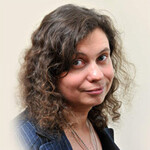
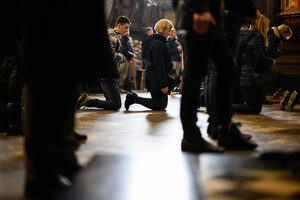


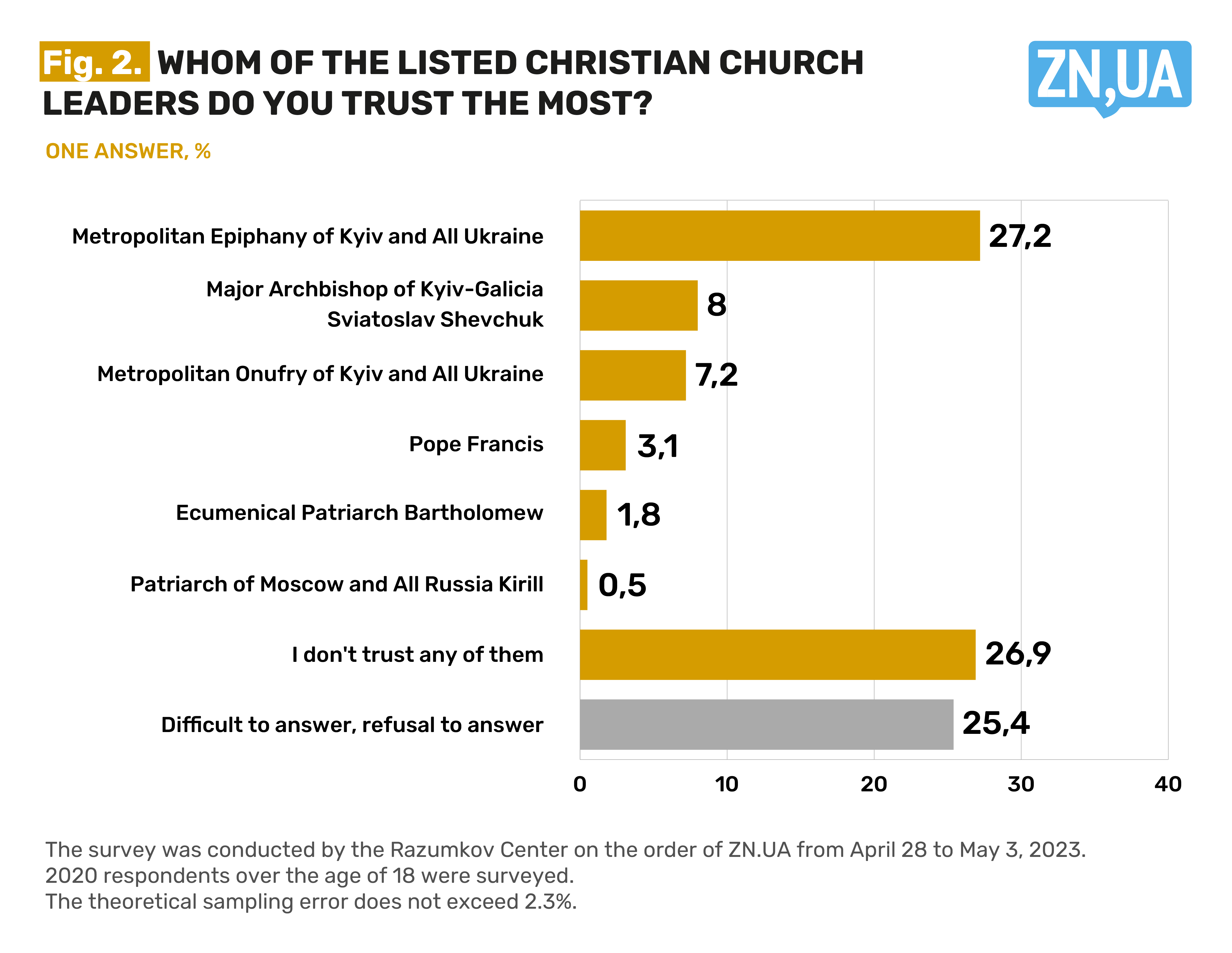


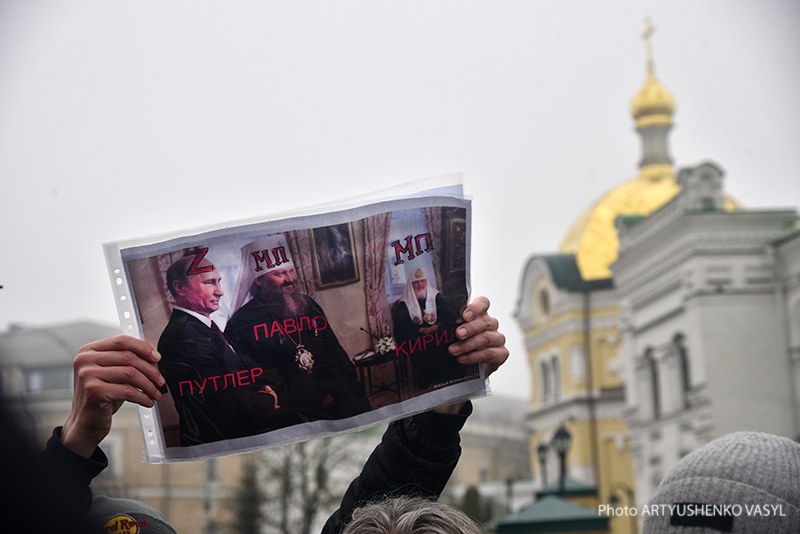
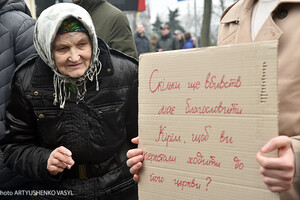
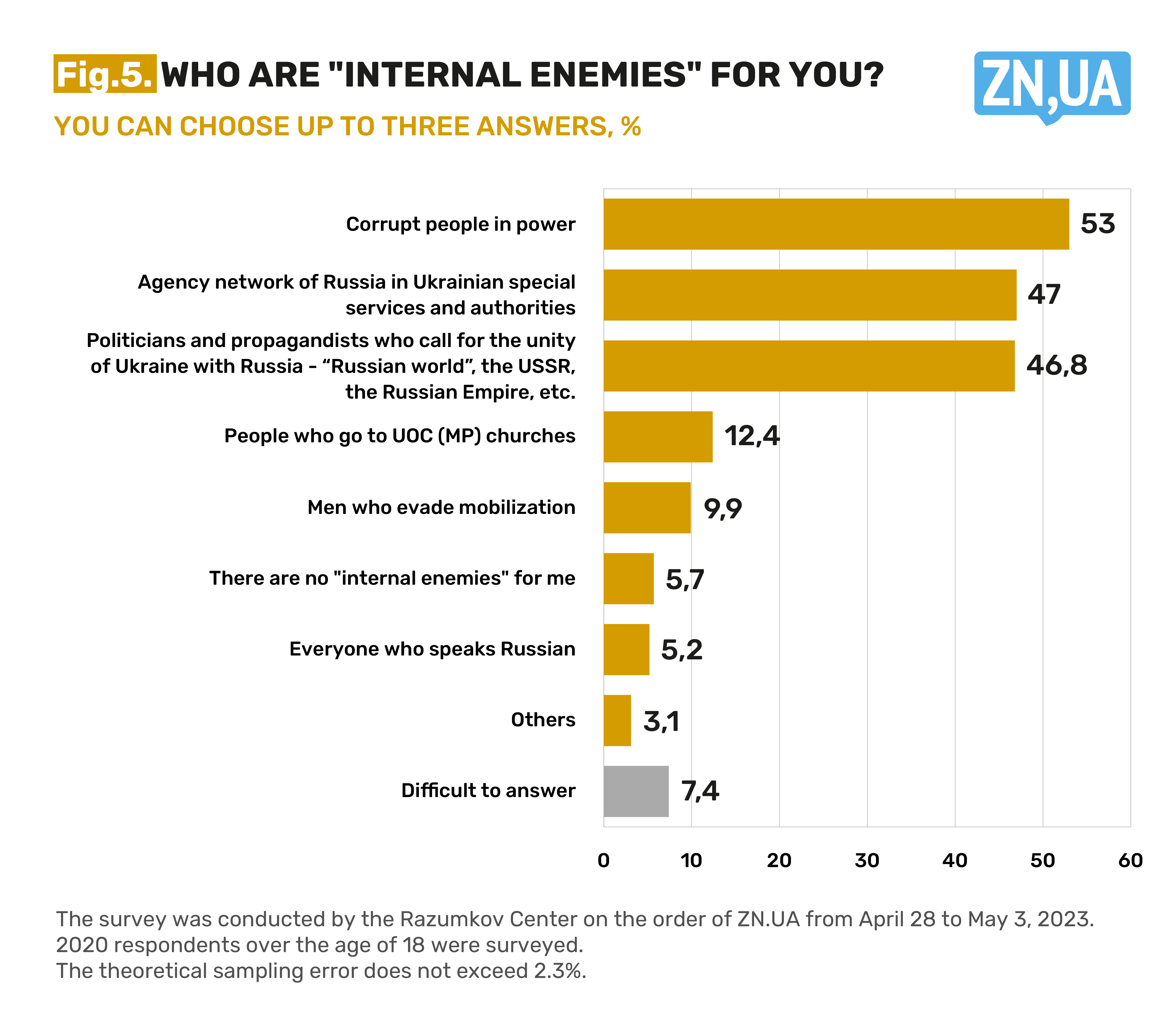
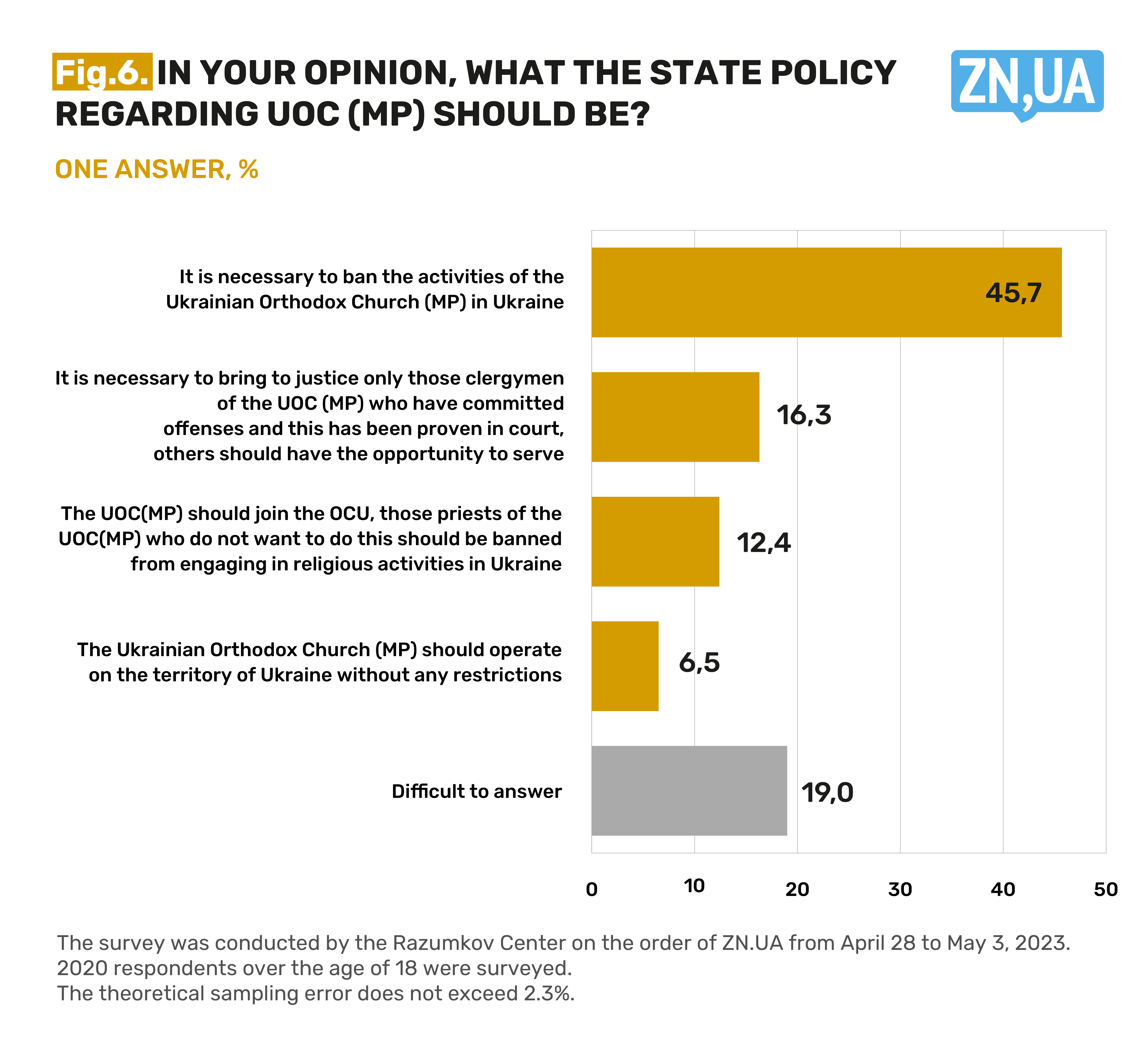
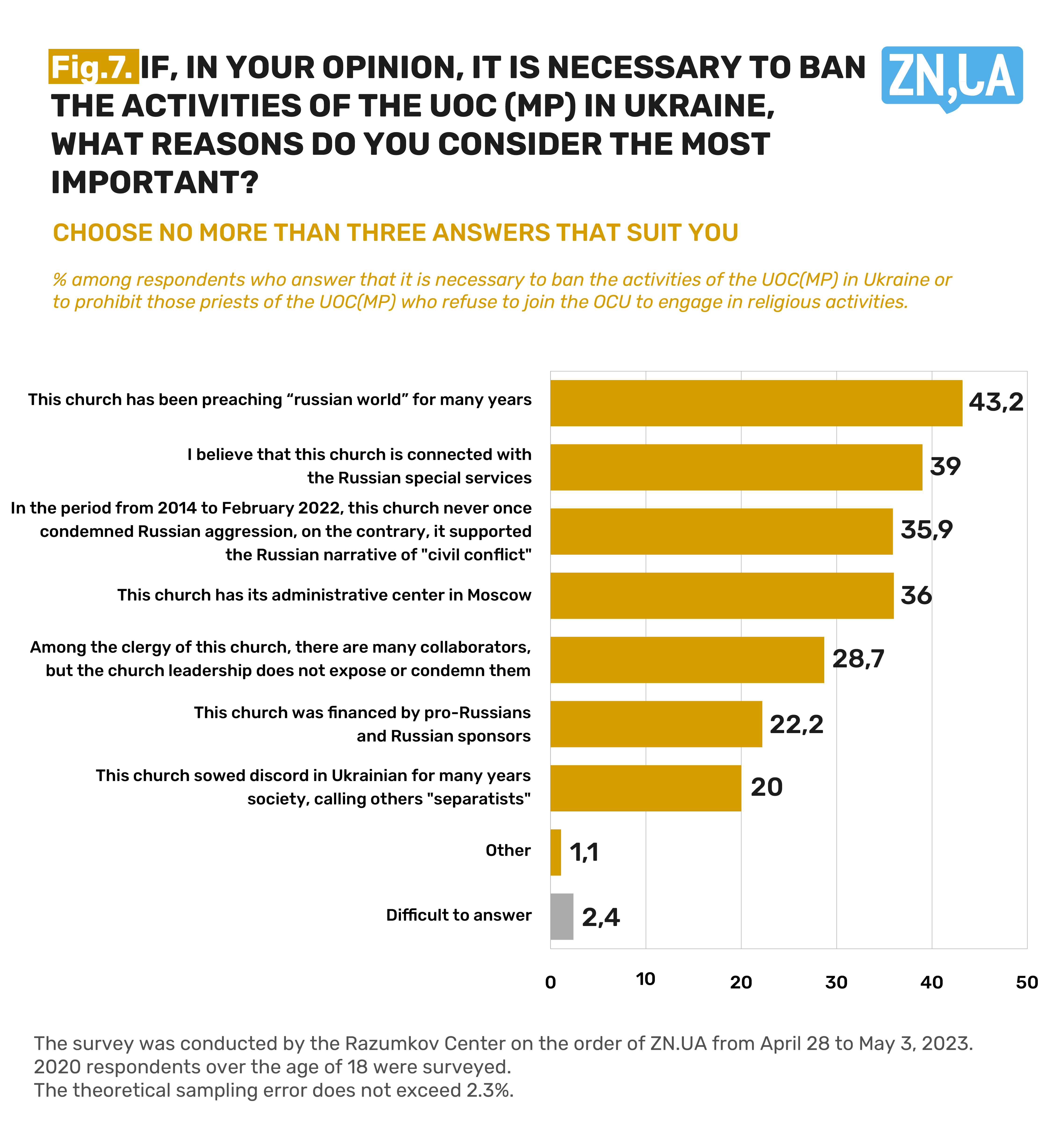
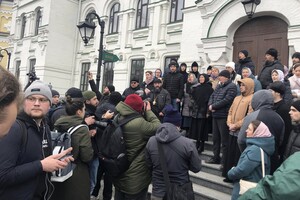


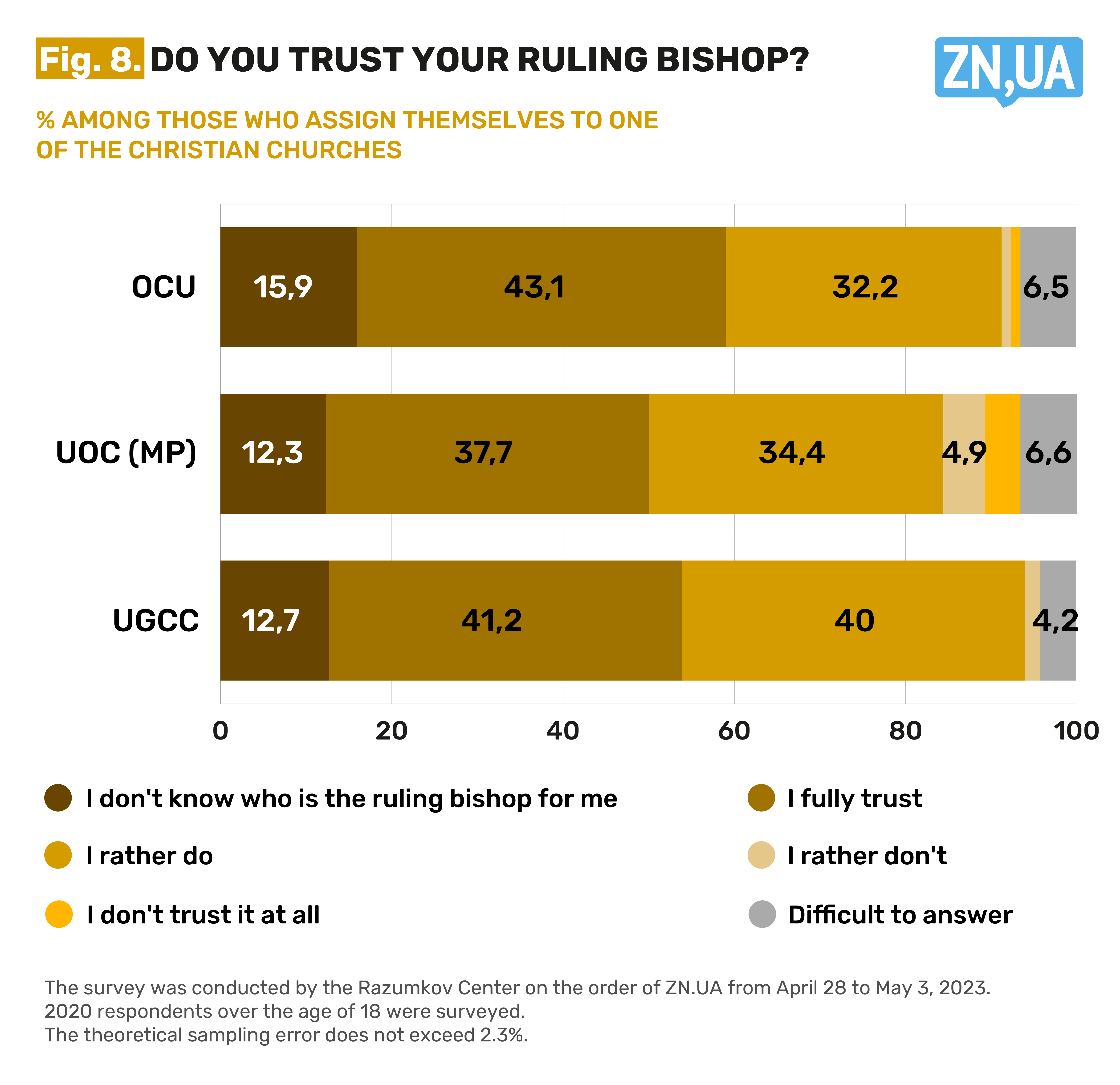
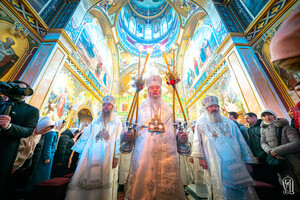
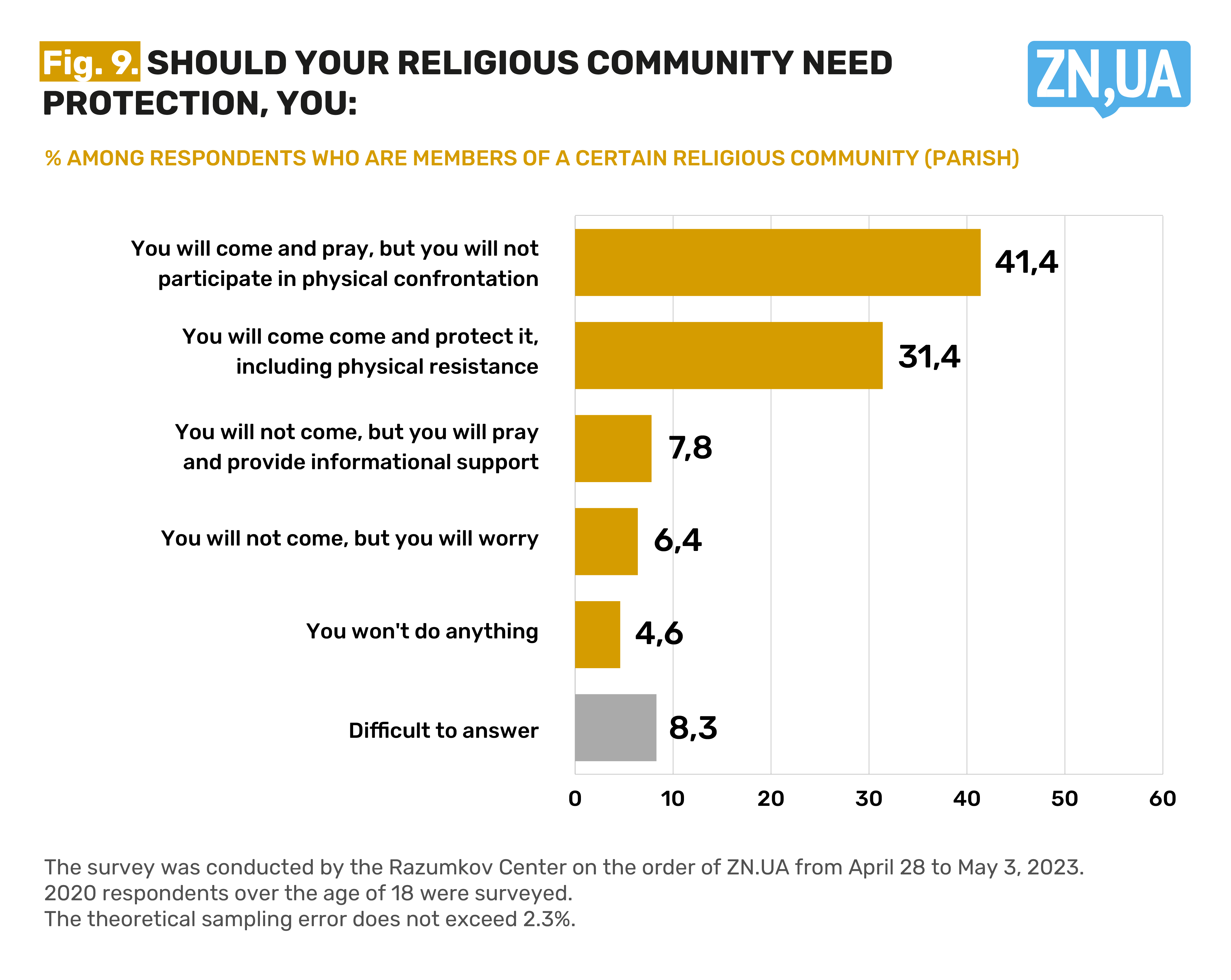
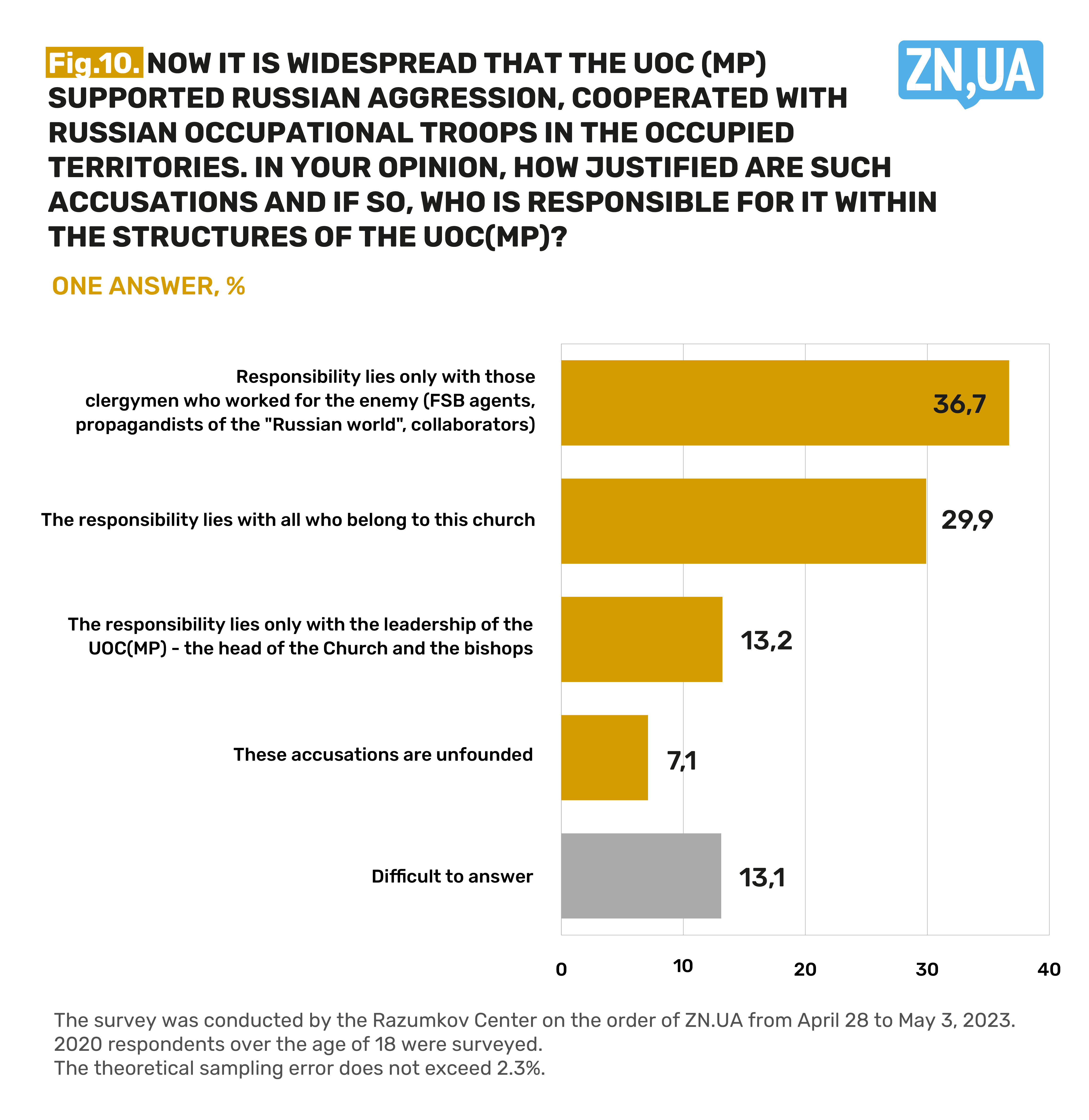

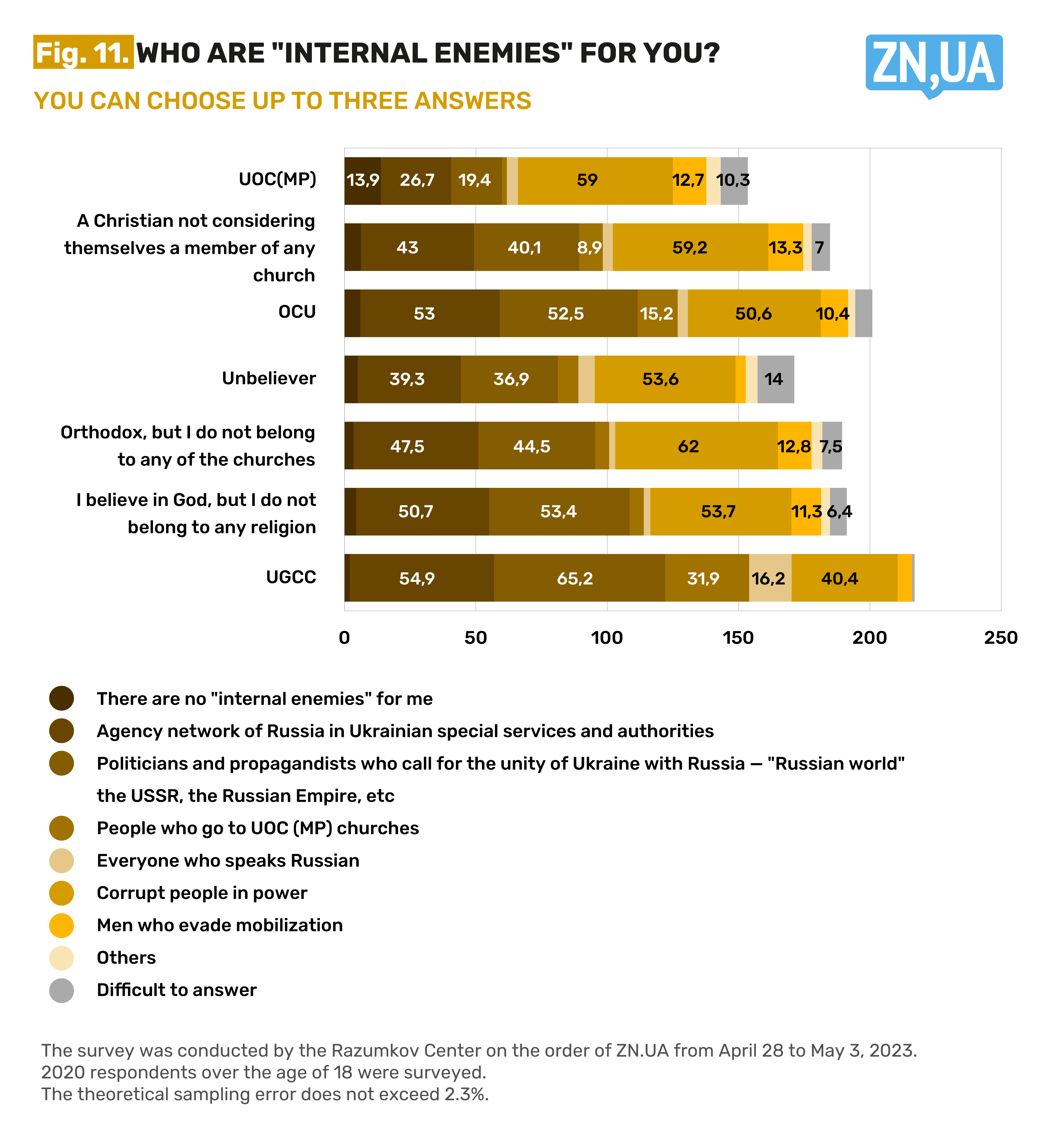
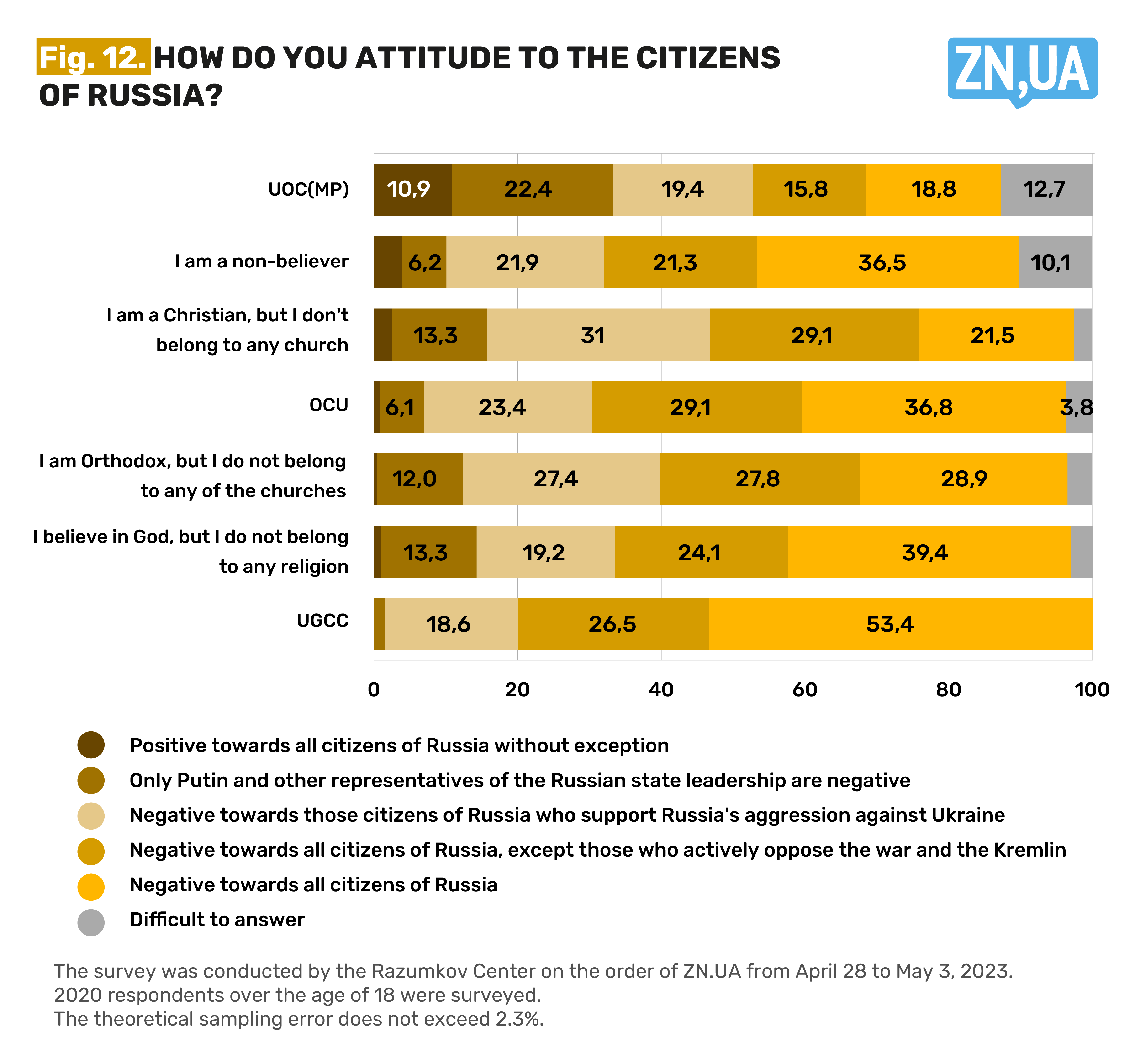
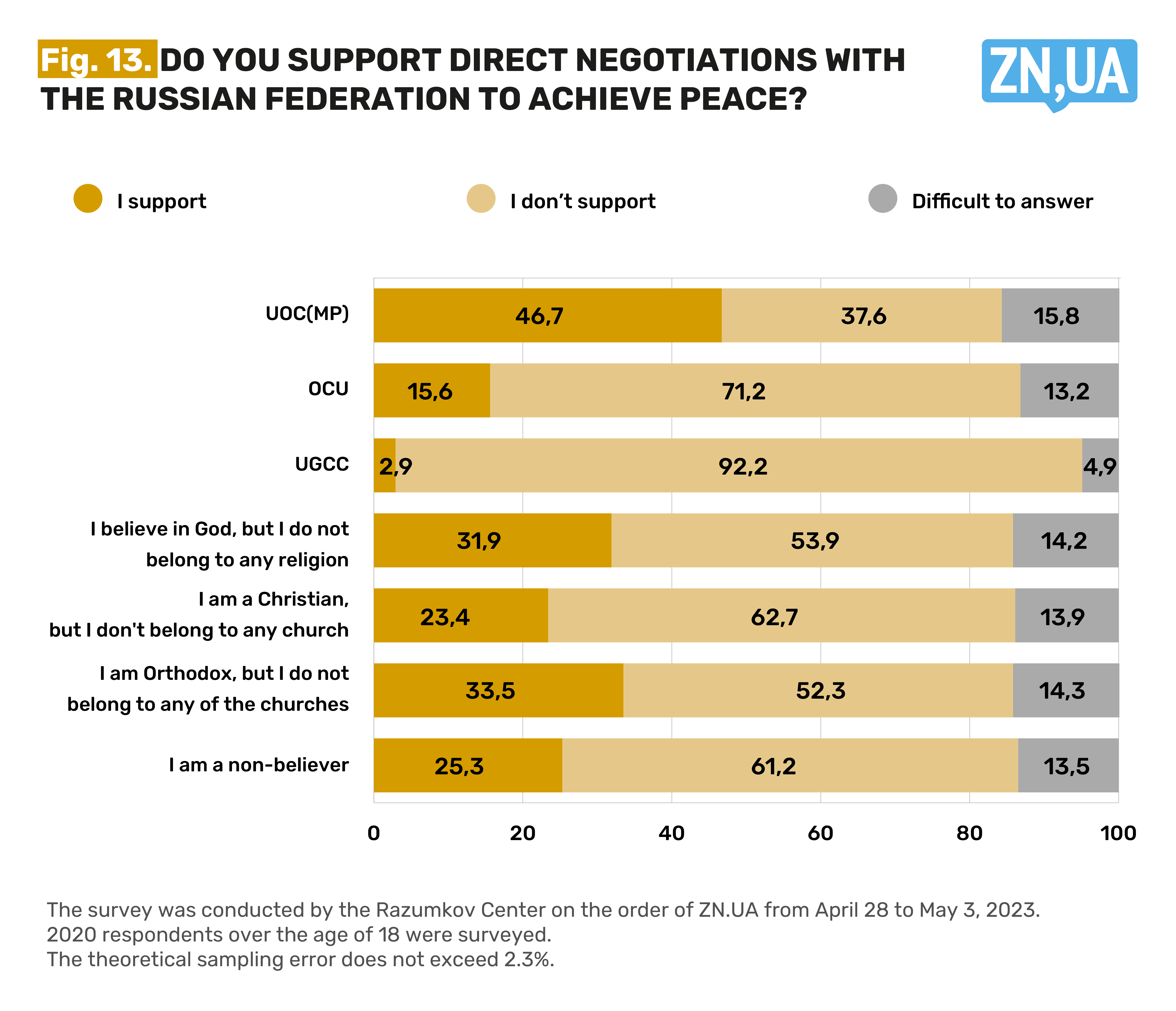
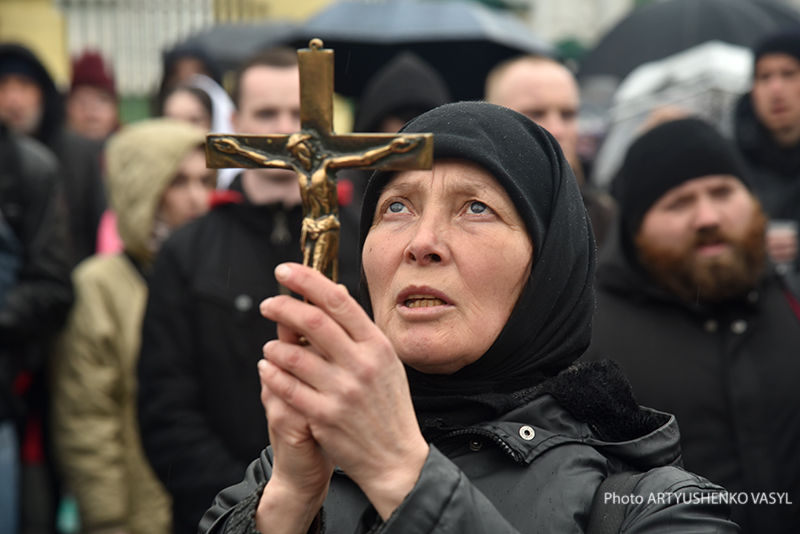

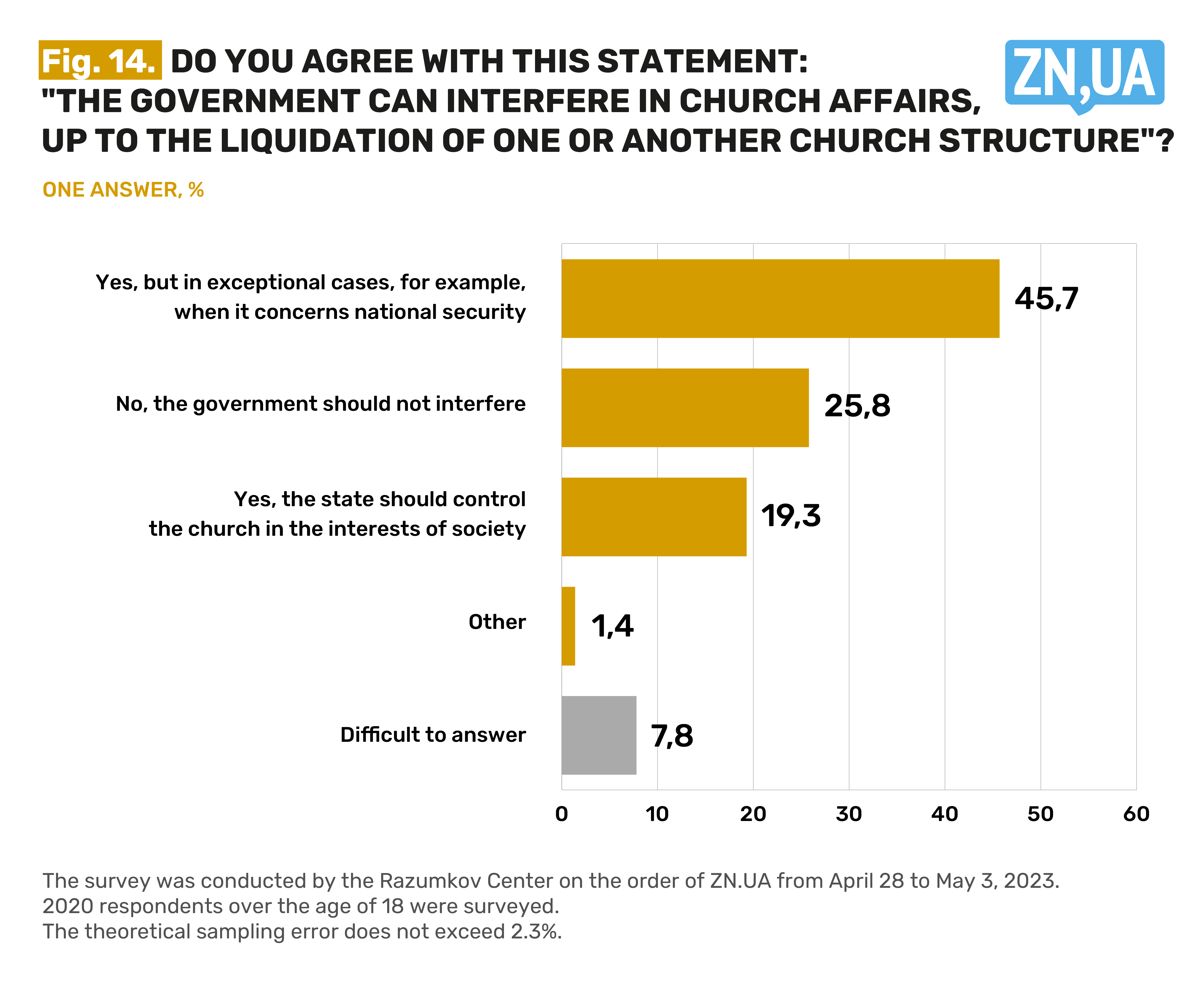
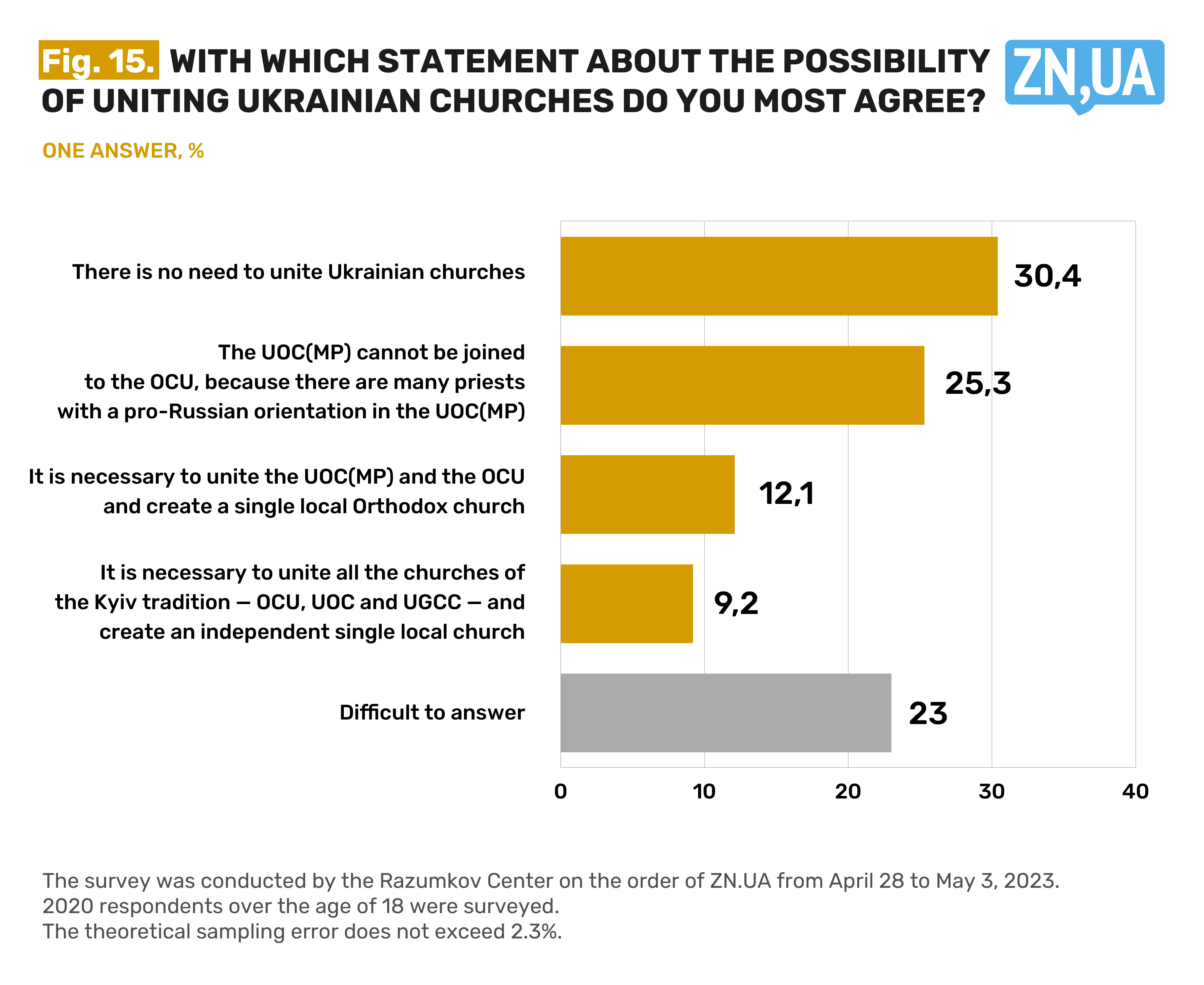
 Login with Google
Login with Google